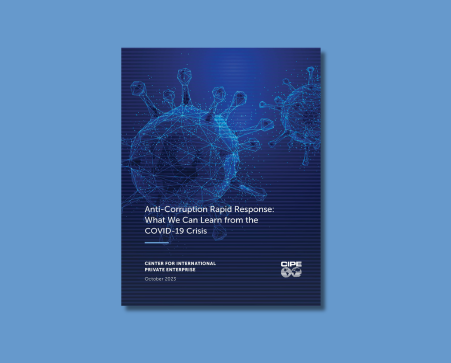Windows of Opportunity: Lessons from the COVID-19 Crisis
As a part of its ongoing efforts to find quick solutions to specific corruption challenges, the latest quarterly gathering of the Center for International Private Enterprise’s Rapid Response Community of Practice focused on whether the COVID-19 crisis opened windows of opportunity for reform. The community is organized by CIPE’s Anti-Corruption & Governance Center (ACGC) and brings together anti-corruption activists, practitioners, donors, and academics to discuss breaking anti-corruption news. These gatherings are often private meetings that encourage candid discussion and new partnerships among anti-corruption professionals.
Speakers for this virtual session were Jorge Flórez and Raquel Rubio, the Associate Director of Fiscal Governance and Director for Listening and Learning respectively for Global Integrity, a Washington-based group that focuses on global governance challenges. The two presented findings from a joint report with CIPE that assesses whether the COVID-19 crisis presented a significant opportunity for swiftly pushing forward anti-corruption reforms. CIPE’s Community of Practice discussions are typically private meetings, given the sensitive nature of the topics, however in this case speakers and other participants allowed for the sharing of a detailed summary of the discussion.
CIPE’s Frank Brown, director of the Anti-Corruption & Governance Center, set expectations by reviewing the history. At the outset of the COVID-19 crisis, he recalled, the global anti-corruption community saw huge risks. Massive government stimulus packages and procurement programs, such as contracts to import personal protection equipment, would be vulnerable to corrupt actors. But they also anticipated that these crisis responses would offer windows of opportunity for anti-corruption reform. The pandemic counted as a sudden change that creates a brief period ripe for reform-minded action. But now, with CIPE, Global Integrity, and others taking stock in the aftermath, Florez and Rubio’s report found a surprisingly different conclusion and some valuable lessons.
 Brown next turned to Rubio, to set out the parameters for the discussion of the final report, Anti-Corruption Rapid Response: What We Can Learn From the COVID-19 Crisis. She and Flórez surveyed anti-corruption groups worldwide and organized their report around five main questions posed to those organizations:
Brown next turned to Rubio, to set out the parameters for the discussion of the final report, Anti-Corruption Rapid Response: What We Can Learn From the COVID-19 Crisis. She and Flórez surveyed anti-corruption groups worldwide and organized their report around five main questions posed to those organizations:
- Did anti-corruption reformers identify windows of opportunity to advance reforms during COVID-19?
- How did they prioritize which to act on?
- If they acted, what factors enabled or hindered them?
- If they didn’t act, what stopped them?
- What did they learn in the process?
The first main finding, Flórez said, was that the pandemic did not actually increase perceived “rapid response” opportunities – a surprise to all. But that doesn’t mean there weren’t lessons to learn. There were plenty. To start, the 56 survey results and the 14 key interviews Rubio and Flórez conducted as a follow-up pointed to an important conclusion: windows of opportunity can’t be spotted by just anyone following a static criteria. It takes in-country relationships and a fine understanding of context and political dynamics, as well as a feel for local attitudes toward corruption.
And actually it takes more than that, the researchers found. Finding and capitalizing on every window possible would require further collaboration to better define what constitutes a genuine window, and how to prepare for them, for example. Anti-corruption leaders told Global Integrity’s researchers that they also need rapid access to information as events change, and plans for mobilizing resources in an organized but flexible way. In other words, a comprehensive playbook.
When reformers did see windows, there were two main identifiers: changes in how populations see corruption, and changes in relationships and power in government. Deciding on whether or not to act was often based on resources available, in-house expertise, and the ability of peer organizations to respond.
Lessons learned start with the importance of preparation – time and effort must have already been dedicated to planning programs that can work. Another lesson was that those carefully prepared interventions were more likely to succeed for those who collaborated with other organizations. Success is less likely for those who attempt to control the whole process. Effective and rapid reforms will also require sustained access to adequate resources, and capacity and planning for effective public communications efforts.
The discussion then turned to recommendations. Rubio and Flórez offered them for three groups:
- In-country reformers should: prepare for future windows by building capacity, testing approaches in advance, establishing their online presence and communications channels, and nurturing relationships with key government agencies
- Global allies should: help build the capacity of local groups through sustainable collaborations featuring flexible approaches, research on windows, and guidance on how to make decisions when windows may be opening
- Donors should: tailor support packages around capacity building, make grant structures flexible for when windows open, support rapid-response approaches, and incentivize greater alignment between in-country and global programming
They offered many more recommendations, and a host of detailed and important findings. To read the full report and follow the pioneering work of CIPE’s Anti-Corruption and Governance Center, click here.